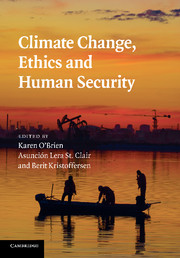Book contents
- Frontmatter
- Contents
- Contributors
- Foreword
- Preface
- Part I Framings
- Part II Equity
- Part III Ethics
- Part IV Reflexivity
- 9 Linking sustainable development with climate change adaptation and mitigation
- 10 Global poverty and climate change: towards the responsibility to protect
- 11 Social contracts in a changing climate: security of what and for whom?
- 12 Towards a new science on climate change
- Index
- References
9 - Linking sustainable development with climate change adaptation and mitigation
Published online by Cambridge University Press: 01 June 2011
- Frontmatter
- Contents
- Contributors
- Foreword
- Preface
- Part I Framings
- Part II Equity
- Part III Ethics
- Part IV Reflexivity
- 9 Linking sustainable development with climate change adaptation and mitigation
- 10 Global poverty and climate change: towards the responsibility to protect
- 11 Social contracts in a changing climate: security of what and for whom?
- 12 Towards a new science on climate change
- Index
- References
Summary
Introduction
Climate change impacts, and potential adaptive and mitigative responses, have been the subject of major assessments by the Intergovernmental Panel on Climate Change (IPCC), including the Fourth Assessment Report, which was published in 2007. Throughout the assessment process, increasing attention was focused on linkages between climate change responses and sustainable development, in part because climate change adds to the list of stressors that challenge the ability to achieve the ecologic, economic and social objectives that define sustainable development. Development choices, furthermore, can inadvertently result in altered vulnerabilities to climate variability and change, changed patterns of energy and material consumption and, consequently, emissions of carbon dioxide and other pollutants. Risks to human security could increase because global climate change interacts with specific regional stresses, including ecosystem degradation, economic difficulties, exposure to climate-related impacts, low response capacities and weak governance systems at sub-national and national scales (Barnett and Adger, 2007).
Klein et al. (2005) suggest that climate policy can evolve to facilitate the successful embedding of climate change within broader development goals to help reduce vulnerability and insecurity, but the integration of adaptation and mitigation at different operational scales remains a challenge (Jones et al., 2007). Although these responses are widely regarded as complements rather than substitutes, gaps in our understanding of the various capacities that are required to carry out these responses have prevented a truly integrated assessment of response options.
- Type
- Chapter
- Information
- Climate Change, Ethics and Human Security , pp. 157 - 179Publisher: Cambridge University PressPrint publication year: 2010
References
- 11
- Cited by

